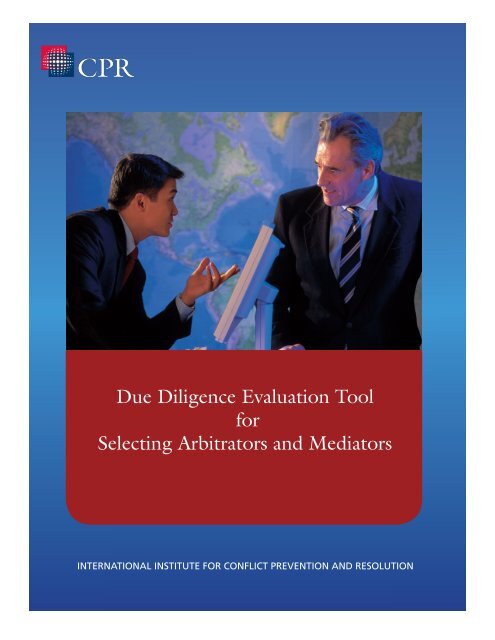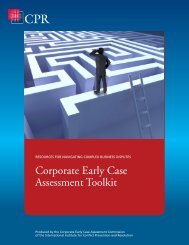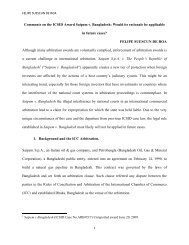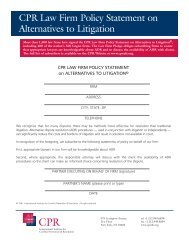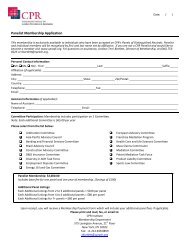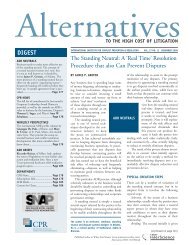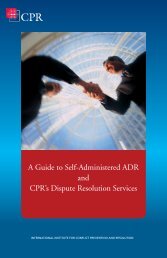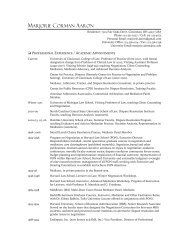Due Diligence Evaluation Tool for Selecting Arbitrators and Mediators
Due Diligence Evaluation Tool for Selecting Arbitrators and Mediators
Due Diligence Evaluation Tool for Selecting Arbitrators and Mediators
Create successful ePaper yourself
Turn your PDF publications into a flip-book with our unique Google optimized e-Paper software.
<strong>Due</strong> <strong>Diligence</strong> <strong>Evaluation</strong> <strong>Tool</strong><br />
<strong>for</strong><br />
<strong>Selecting</strong> <strong>Arbitrators</strong> <strong>and</strong> <strong>Mediators</strong><br />
INTERNATIONAL INSTITUTE FOR CONFLICT PREVENTION AND RESOLUTION
About CPR<br />
The International Institute <strong>for</strong> Conflict Prevention <strong>and</strong> Resolution (CPR) serves as an<br />
independent, objective resource <strong>for</strong> the avoidance, management <strong>and</strong> resolution of complex<br />
business-related disputes. By harnessing the expertise of leading minds in ADR <strong>and</strong><br />
benchmarking best practices, it is the resource of choice <strong>for</strong> multinational corporations with<br />
billions of dollars at risk. No other organization has equal influence, range of international<br />
property, or breadth of programs focused exclusively on commercial conflict management.<br />
CPR is also the leading destination <strong>for</strong> lawyers seeking superior arbitrators <strong>and</strong> mediators, as<br />
well as cutting-edge ADR tools <strong>and</strong> training. CPR’s membership comprises an elite group of<br />
ADR trailblazers, including executives <strong>and</strong> legal counsel from the most successful companies<br />
in the world, partners from global law firms, government officials, retired judges, highlyexperienced<br />
neutrals, <strong>and</strong> academic heavyweights.<br />
Learn more at www.cpradr.org.<br />
_______________________________________________________________________________<br />
International Institute <strong>for</strong><br />
Conflict Prevention & Resolution<br />
575 Lexington Avenue, 21 st Floor<br />
New York, NY 10022<br />
+1.212.949.6490<br />
www.cpradr.org<br />
info@cpradr.org
DUE DILIGENCE EVALUATION TOOL FOR<br />
SELECTING ARBITRATORS AND MEDIATORS<br />
When considering Neutral c<strong>and</strong>idates <strong>for</strong> an upcoming mediation or arbitration, it is<br />
beneficial to obtain relevant in<strong>for</strong>mation about their skills <strong>and</strong> experience to determine their<br />
suitability <strong>for</strong> your particular matter. There are various ways to obtain such in<strong>for</strong>mation. CPR<br />
has already embarked on one such means, the on-line evaluation tool with Positively Neutral.<br />
Another vehicle <strong>for</strong> per<strong>for</strong>ming due diligence of Neutrals is interviewing c<strong>and</strong>idates directly<br />
to obtain in<strong>for</strong>mation from their prior experiences relevant to the requirements <strong>for</strong> a<br />
particular case.<br />
An additional due diligence tool <strong>for</strong> evaluating Neutral c<strong>and</strong>idates is communicating directly<br />
with someone who has had experience with an arbitrator or mediator c<strong>and</strong>idate under<br />
consideration. Personal communications can provide insightful in<strong>for</strong>mation about whether<br />
the c<strong>and</strong>idate is likely to be effective <strong>for</strong> a particular dispute. Such discussions can also<br />
amplify or clarify the summary in<strong>for</strong>mation obtained from the Positively Neutral tool. So,<br />
once individuals familiar with the c<strong>and</strong>idate’s skills <strong>and</strong> experience have been identified, what<br />
questions might elicit in<strong>for</strong>mation that will be relevant in evaluating whether the arbitrator or<br />
mediator will be effective <strong>for</strong> your particular case?<br />
CPR’s <strong>Due</strong> <strong>Diligence</strong> <strong>Evaluation</strong> <strong>Tool</strong> (DET) is a grouped listing of potential questions designed<br />
to facilitate a more in<strong>for</strong>med evaluation of potential arbitrator <strong>and</strong> mediator c<strong>and</strong>idates. The<br />
questions explore topics such as the nature <strong>and</strong> complexity of the prior arbitrations <strong>and</strong><br />
mediations in which the Neutral has served as well as the Neutral’s prior per<strong>for</strong>mance (e.g.,<br />
preparedness, disposition, effectiveness).<br />
The DET is not intended to be a questionnaire <strong>for</strong> obtaining written responses from contacts<br />
having prior experience with the Neutral. Rather, after reviewing whatever in<strong>for</strong>mation is<br />
available about the mediator or arbitrator (e.g., biographical, Positively Neutral evaluation),<br />
CPR members can select questions from the DET <strong>for</strong> subsequent discussions with others who<br />
have previously used the Neutral to obtain more particular in<strong>for</strong>mation about how effective<br />
the c<strong>and</strong>idate is likely to be in their particular case.<br />
The DET is not intended to provide a comprehensive list of due diligence questions, nor is it<br />
intended to overwhelm the due diligence process. In the latter regard, DET also embodies a<br />
short <strong>for</strong>m <strong>for</strong> the same purpose as the longer version of the DET.<br />
Copyright © 2010 by International Institute <strong>for</strong> Conflict Prevention <strong>and</strong> Resolution, Inc. All rights reserved.
SHORT FORM<br />
DUE DILIGENCE EVALUATION TOOL FOR SELECTING ARBITRATORS<br />
GENERAL INFORMATION<br />
Name/Position/Employer of Individual Contacted:<br />
Contact’s familiarity with the arbitrator’s skills <strong>and</strong> experience (e.g., professional acquaintance,<br />
hearsay, witnessed prior arbitrations):<br />
Arbitrator’s position (i.e., wingman, chair) in prior arbitration(s)?<br />
INFORMATION REGARDING PRIOR ARBITRATIONS<br />
IN WHICH THE ARBITRATOR PARTICIPATED<br />
(e.g., subject matter, complexity, amount at stake)<br />
ARBITRATOR’S PERFORMANCE ON PRIOR PANELS<br />
(e.g., grasp of issues, disposition, management skills, quality<br />
of work product, preparedness)<br />
SUMMARY QUESTIONS<br />
<br />
Did the arbitrator rule the way you wanted him/her to rule?<br />
<br />
Was the arbitrator open-minded, unbiased <strong>and</strong> fair?<br />
<br />
Did the arbitrator fully underst<strong>and</strong> the issues?<br />
<br />
Would you choose the arbitrator again?<br />
2
DUE DILIGENCE EVALUATION TOOL FOR SELECTING ARBITRATORS<br />
In considering arbitrator c<strong>and</strong>idates, there is often no substitute <strong>for</strong> engaging directly with<br />
someone who has had experience with an arbitrator c<strong>and</strong>idate under consideration. Realtime<br />
discussion often provides insightful in<strong>for</strong>mation about how <strong>and</strong> why the c<strong>and</strong>idate is<br />
likely to be a suitable arbitrator <strong>for</strong> a particular upcoming arbitration.<br />
This <strong>Due</strong> <strong>Diligence</strong> <strong>Evaluation</strong> <strong>Tool</strong> (DET) is a grouped listing of potential questions designed<br />
to facilitate a more in<strong>for</strong>med evaluation of potential arbitrator c<strong>and</strong>idates. The following list<br />
of potential questions is intended to assist CPR members in learning relevant in<strong>for</strong>mation<br />
about arbitrators they are considering <strong>for</strong> a <strong>for</strong>thcoming arbitration. It is contemplated that<br />
these questions, or a subset of them, will be useful in interviewing parties who previously<br />
used the arbitrator c<strong>and</strong>idate in an arbitration.<br />
Members may want to use these questions alone or as an adjunct to the online arbitrator<br />
evaluations compiled by Positively Neutral, to amplify or clarify the in<strong>for</strong>mation elicited in<br />
the evaluations.<br />
<br />
POTENTIAL QUESTIONS<br />
I. Describe the Prior Arbitration(s) in Which You Observed the Arbitrator’s<br />
Involvement. (Determine whether based upon the nature of the prior arbitration(s) the<br />
arbitrator c<strong>and</strong>idate would be suitable <strong>for</strong> your arbitration.)<br />
A. In what kind of arbitration(s) have you witnessed the arbitrator’s capabilities<br />
(e.g., contract, intellectual property, labor/employment, oil/gas)?<br />
B. Describe the complexity of the arbitration (e.g., novel/complex issues, multiple<br />
claims/counterclaims, multiple parties, motions, damages/attorney fees)?<br />
C. Were there notable characteristics about the arbitration (e.g., international parties,<br />
gender/cultural/racial issues, language barriers)?<br />
II.<br />
If the Arbitrator Served as a Wing-Person, How Did He/She Per<strong>for</strong>m? (Determine<br />
whether an arbitrator’s prior per<strong>for</strong>mance as a wing-person can be used to assess his/her<br />
per<strong>for</strong>mance in your case as a wing-person, chair or sole arbitrator.)<br />
A. If the arbitrator actively participated on phone or at in-person conferences <strong>and</strong><br />
hearings, what was his/her grasp of the issues?<br />
B. Did the arbitrator dissent with reasons from any of the rulings (e.g., orders, awards)<br />
of the panel? Even if you did not agree with the dissent or the reasons <strong>for</strong> it, do you<br />
believe the decision to dissent <strong>and</strong> any supporting reasons were legally supportable?<br />
C. What was the arbitrator’s disposition (e.g., courteous, alert, fair, even-h<strong>and</strong>ed)?<br />
3
III.<br />
If the Arbitrator Served as the Chair or the Sole Arbitrator, How Did He/She<br />
Per<strong>for</strong>m? (Determine whether the arbitrator’s prior per<strong>for</strong>mance as the chair or sole arbitrator<br />
can be used to assess how effective the arbitrator is likely to be in your arbitration.)<br />
A. How well did the arbitrator manage the proceedings?<br />
1. Was the arbitrator organized?<br />
2. How did the arbitrator maintain order on calls <strong>and</strong> at the hearing(s)<br />
3. Did the arbitrator hold conferences <strong>and</strong> hearings in a timely manner?<br />
4. Did the arbitrator issue orders <strong>and</strong> awards promptly?<br />
5. Did the arbitrator deal with discovery disputes in a timely <strong>and</strong> effective manner?<br />
6. Was the arbitrator competent at h<strong>and</strong>ling procedural <strong>and</strong> evidentiary issues?<br />
7. Did the arbitrator require the parties to per<strong>for</strong>m any work or travel that the<br />
parties deemed to be unreasonable?<br />
B. Describe the Chair’s/Sole Arbitrator’s Disposition During the Proceedings.<br />
1. Was the arbitrator courteous to the arbitrators on the panel <strong>and</strong> to the parties?<br />
2. Did the arbitrator treat the parties/counsel in a fair <strong>and</strong> even-h<strong>and</strong>ed manner?<br />
3. Did the arbitrator remain alert at conferences <strong>and</strong> hearings?<br />
C. Was the Written Product of the Chair/Sole Arbitrator the Quality Expected?<br />
1. Were pre-hearing procedural orders (e.g., scheduling orders) written clearly, <strong>and</strong><br />
were they easy to follow?<br />
2. Were orders <strong>and</strong> awards clear (e.g., easy to follow) <strong>and</strong> well reasoned (i.e.,<br />
depending upon the level of detail requested by the parties)?<br />
D. Was the Chairperson/Sole Arbitrator Adequately Prepared?<br />
1. Did it appear that the arbitrator read the parties’ submissions (e.g., pleadings<br />
be<strong>for</strong>e the preliminary hearing, motion papers be<strong>for</strong>e a hearing on the motion,<br />
hearing briefs be<strong>for</strong>e the evidentiary hearing)?<br />
2. Did the arbitrator underst<strong>and</strong> <strong>and</strong> apply the relevant rules <strong>and</strong> law governing<br />
the arbitration?<br />
3. Describe the arbitrator’s grasp of the issues?<br />
IV.<br />
Were the Arbitrator’s Facilities Adequate? (If the arbitrator used his/her facilities <strong>for</strong> the<br />
prior arbitration(s) would they be adequate <strong>for</strong> your case?)<br />
A. Was the arbitrator’s administrative support adequate?<br />
B. Were the arbitrator’s facilities adequate, if they were used <strong>for</strong> any of the<br />
proceedings?<br />
V. If the Opportunity Presented Itself, Would You Choose to Use the<br />
Arbitrator Again?<br />
4
Short Form<br />
DUE DILIGENCE EVALUATION TOOL FOR SELECTING MEDIATORS<br />
GENERAL INFORMATION<br />
Name/Position/Employer of Individual Contacted:<br />
Contact’s familiarity with mediator’s skills <strong>and</strong> experience (e.g., professional acquaintance, hearsay,<br />
witnessed prior mediations):<br />
What was the mediator’s style (e.g., facilitative, evaluative, trans<strong>for</strong>mative) in the prior mediation?<br />
INFORMATION REGARDING PRIOR MEDIATIONS IN WHICH THE MEDIATOR PARTICIPATED<br />
(e.g., subject matter, complexity, amount at stake)<br />
MEDIATOR’S PRACTICES IN PRIOR MEDIATIONS<br />
(e.g., pre-mediation submissions, pre <strong>and</strong> post mediation contact, joint session, caucuses)<br />
MEDIATOR’S PERFORMANCE IN PRIOR MEDIATIONS<br />
(e.g., grasp of issues, management skills, mediation skills, neutrality)<br />
SUMMARY QUESTIONS<br />
<br />
Did the dispute settle as a result of the mediator’s ef<strong>for</strong>ts?<br />
<br />
Was the mediator open-minded, unbiased <strong>and</strong> fair?<br />
<br />
Did the mediator fully underst<strong>and</strong> the issues?<br />
<br />
Would you choose the mediator again?<br />
5
DUE DILIGENCE EVALUATION TOOL<br />
FOR SELECTING MEDIATORS<br />
In considering mediator c<strong>and</strong>idates, there is often no substitute <strong>for</strong> engaging directly with<br />
someone who has had experience with a mediator c<strong>and</strong>idate under consideration. Real-time<br />
discussion often provides insightful in<strong>for</strong>mation about how <strong>and</strong> why the c<strong>and</strong>idate is likely to<br />
be a suitable mediator <strong>for</strong> a particular upcoming mediation.<br />
This <strong>Due</strong> <strong>Diligence</strong> <strong>Evaluation</strong> <strong>Tool</strong> (DET) is a grouped listing of potential questions designed<br />
to facilitate a more in<strong>for</strong>med evaluation of potential mediator c<strong>and</strong>idates. The following list<br />
of potential questions is intended to assist CPR members in learning relevant in<strong>for</strong>mation<br />
about mediators they are considering <strong>for</strong> a <strong>for</strong>thcoming mediation. It is contemplated that<br />
these questions, or a subset of them, will be useful in interviewing parties who previously<br />
used the mediator c<strong>and</strong>idate in a mediation.<br />
Members may want to use these questions alone or as an adjunct to the online mediator<br />
evaluations compiled by Positively Neutral, to amplify or clarify the in<strong>for</strong>mation elicited in<br />
the evaluations.<br />
<br />
POTENTIAL QUESTIONS<br />
I. Describe the Prior Mediation(s) in Which You Observed the Mediator’s Skills.<br />
(Determine whether based upon the nature of the prior mediations the mediator c<strong>and</strong>idate would<br />
be suitable <strong>for</strong> your mediation.)<br />
A. In what kind of mediations have you witnessed the Mediator’s capabilities?<br />
1. What was the nature of the dispute (e.g., contract, intellectual property,<br />
labor/employment, oil/gas) in the prior mediation?<br />
2. Describe the complexity of the dispute (e.g., multiple claims/counterclaims,<br />
multiple parties, global settlement issues, damages/attorney fees)?<br />
3. Were there notable characteristics about the mediation (e.g., time pressures,<br />
international parties, gender/cultural/racial issues, language barriers)?<br />
B. In the prior mediation, what style(s) did the mediator use (e.g., facilitative, evaluative,<br />
trans<strong>for</strong>mative)?<br />
1. Was the mediator effective in using the style he/she chose or the<br />
parties requested?<br />
2. Did the mediator treat the parties/counsel even h<strong>and</strong>edly?<br />
II. Did the Mediator Effectively Manage the Mediation Process? (Determine whether based<br />
upon the mediator’s management of the prior mediation(s) the mediator c<strong>and</strong>idate could effectively<br />
manage the process contemplated <strong>for</strong> your mediation.)<br />
A. How did the mediator work with the parties to design the mediation process?<br />
B. How did the mediator h<strong>and</strong>le pre-mediation submission(s)?<br />
C. Was the mediator adequately prepared <strong>for</strong> the mediation?<br />
D. How did the mediator use pre or post mediation session calls or meetings?<br />
E. Did the mediator require the parties to do anything that was unnecessary <strong>and</strong> that<br />
increased the cost of the mediation?<br />
6
III. Were the Mediator’s Capabilities <strong>and</strong> Experience Appropriate <strong>for</strong> the Case? (Determine<br />
whether based upon the mediator’s skills <strong>and</strong> experience exhibited in the prior mediations the<br />
mediator c<strong>and</strong>idate would have the skills <strong>and</strong> experience necessary <strong>for</strong> your case.)<br />
A. If you retained the mediator <strong>for</strong> his/her expertise in a particular subject matter area,<br />
was that expertise adequate?<br />
B. Was the mediator’s skills/experience adequate?<br />
C. How did the mediator effectively <strong>and</strong>/or creatively use the mediation process?<br />
D. How did the mediator maintain control over emotional participants?<br />
E. How did the mediator deal with impasse?<br />
F. Was the mediator perseverant?<br />
G. How did the mediator h<strong>and</strong>le any discovery or in<strong>for</strong>mation exchange issues?<br />
IV. Were the Mediator’s Facilities Adequate (If the mediator used his/her facilities <strong>for</strong> the prior<br />
mediation(s) would they be adequate <strong>for</strong> your case?)<br />
A. How would you rate the mediator’s administrative support?<br />
B. How would you rate the mediator’s facilities, if they were used <strong>for</strong> any of the<br />
proceedings?<br />
V. If the Opportunity Presented Itself, Would You Choose to Use the Mediator Again?<br />
7


